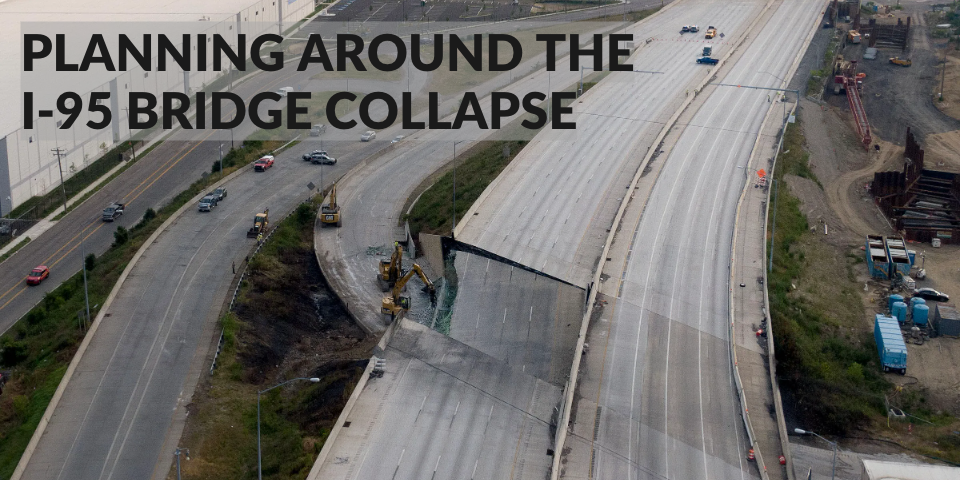
Planning Around the I-95 Bridge Collapse
*At the time of publication, the bridge has partially opened.
In the aftermath of the I-95 bridge collapse in Northeast Philadelphia, the region's trucking community has already been drastically impacted. With this crucial artery cut off for a seemingly undetermined amount of time, it is imperative that truck drivers stay informed, modify their strategies, and adapt their operations to maintain quality service and productivity.
Stay Informed
While most in the expedite world may not be directly affected by the bridge collapse, the primary step for any transportation professional is to ensure that they have the most accurate and up-to-date information. Make sure to follow local news and traffic reports and regularly check the Pennsylvania Department of Transportation's website for official updates on the repair process as well as any anticipated timelines.
For real-time traffic data, utilize navigation and logistics software such as Google Maps, Waze, or commercial trucking GPS systems like Garmin dezl or Rand McNally. These apps and platforms can provide valuable insights on traffic flow, congestion points, and alternative routes.
Reroute Strategically
Considering the importance of I-95, its closure will significantly disrupt supply chains. Especially for local drivers, as the majority of national freight movement typically routes through nearby Interstate 295 and the New Jersey Turnpike.
Truckers should plan alternative routes. Depending on their destinations, routes via I-76, I-295, and I-476 could be suitable alternatives. However, these routes may also be congested due to increased traffic, so be prepared to adjust transit plans accordingly.
While planning any alternative routes, remember that not all roads will be suitable for large trucks. Make sure to be aware of low clearance bridges, weight restrictions, and any residential areas where trucks might be prohibited.
Plan for Delays
Rebuilding a major highway infrastructure such as the I-95 bridge is a massive task and it will inevitably lead to long-term delays. Truck drivers will need to adjust their timelines and communicate openly with their clients and dispatchers about the circumstances they encounter.
Understand that trips will likely take longer than usual due to increased traffic and indirect routes. Try to implement measures to ensure driver safety and avoiding fatigue, such as additional rest stops and driver shift rotations.
Prepare for Additional Costs
A spokesperson for the American Trucking Association (ATA) states that, "Vehicles are now subject to more than 40 miles of detour, a detour that is mostly non-Interstate highway with more than 60 traffic lights." The spokesperson added, "This will add significant cost in time, fuel and delays so we urge state and federal agencies to target appropriate resources to repairing and replacing this highway as quickly as possible."
Fuel costs and maintenance expenses are likely to increase due to these longer routes and the potential to idle in traffic. Planning and budgeting for these additional costs will help maintain profitability during such a challenging period.
Stay Flexible
Finally, truckers should try to remain flexible and understanding during such an uncertain period. Changes are likely to occur with little notice, and the ability to adapt quickly to new information and circumstances will be a vital advantage to the driver and their team.
The I-95 bridge collapse in Philadelphia is a significant disruption to the region's transportation network. However, with the right strategies and a flexible approach, professional drivers can continue to deliver on their crucial services while navigating any unforeseen challenges.
